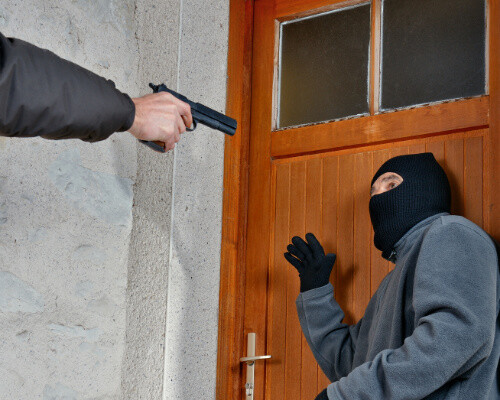The law in Colorado states that if a person has made an uninvited entry into a dwelling, any occupant of the dwelling is justified in using physical force, to include deadly force, if the occupant of the dwelling reasonably believes that the intruder has or will commit a crime in the dwelling in addition to the uninvited entry, and the occupant reasonably believes that the intruder may use physical force, no matter how slight, against an occupant of the dwelling.
If it is clear that these circumstances apply, the law in Colorado provides immunity from criminal prosecution for any occupant of the dwelling who uses physical force against an intruder. Further, the law in Colorado provides immunity from civil liability for any occupant of a dwelling who uses force against an intruder in these circumstances.
The short answer is YES. It doesn’t matter if the person who has entered your dwelling uninvited has a weapon or not, if you believe they are going to commit a crime against a person or property and also believe that they might try to do bodily harm to you or someone else in the dwelling, then you have every right to protect yourself using any means possible with immunity from prosecution. This could mean using a baseball bat, knife, pistol, shotgun, sword or anything you have laying around that could help you defend yourself. Colorado has recognized the right of its citizens to expect absolute safety within their own homes, which is the legislative basis for this law justifying the use of deadly force in these scenarios.
It is important to note though, that not all states give you this right, so if you are not in Colorado, make sure to check your local regulations so you have the right information for the location you reside in.
There are 22 states that provide civil immunity under certain self defense circumstances as outlined in a Make My Day Law. These states are as follows: Arizona, Arkansas, Colorado, Florida, Georgia, Idaho, Illinois, Kentucky, Louisiana, Maryland, Michigan, Montana, New Hampshire, North Carolina, North Dakota, Oklahoma, Ohio, Pennsylvania, South Carolina, Tennessee, West Virginia, and Wisconsin.
You may have heard of “Duty To Retreat” before, which basically means that in a situation where someone is intending or threatening to do you harm, you have the duty to try to escape the situation before using force against the person attempting to do you harm.
When dealing with questions of self-defense law, it is important to stress that all states are different. In Colorado though, you do not have a duty to retreat before using physical force in self-defense in a dwelling.
Even outside of a dwelling, Colorado law does not require a person to retreat before using physical force in self-defense. Use of physical force in self-defense is justified in Colorado when an actor reasonably believes another person is using or is about to use unlawful physical force against the actor. Outside of a dwelling, however, a person is only justified in using the degree of physical force that he or she reasonably believes to be necessary to repel an unlawful attack by another person. Deadly force is justified under some circumstances, the most straight-forward being that you reasonably believe that your life or the life of another person are in imminent danger.
One of the biggest things that people commonly get wrong when it comes to self-defense law and the Make My Day Law in particular is that you can just shoot anyone that walks onto your property and not worry about getting in trouble for it. This is absolutely false and needs to be clarified so that people have a solid understanding of what is lawful and what is not. Use of any amount of force against a person is not to be taken lightly, and the law certainly does not justify the wanton killing of another person without sufficient justification. Hurting another person, or taking a person’s life, is a very heavy burden to carry, regardless of justification. It is best to avoid it if possible.
If someone is on your property, stealing something out of your car or is vandalizing your property, it is NOT ok to shoot them. For it to be legal to shoot someone under this law, the intruder needs to be inside of a dwelling with you and you suspect that they will/have committed a crime and you suspect that they will try to harm you.
Let’s look at some real world examples for clarification. In 2016 there was a man in Denver, CO that shot two teenagers who had climbed into his backyard and were trying to steal his marijuana plants. The resident of the home shot the teens from his second story window of the home while the teens were in the yard. One trespasser was injured, the other one was killed. In this situation, since the resident was not in immediate danger and the trespassers were outside of his home, he was charged with multiple crimes such as first degree murder. You can see how knowing the laws makes a massive difference in your outcome.
For the law to clearly apply, you and the intruder would both have to be within your dwelling, and the intruder would have to be inside uninvited. Next, the intruder would need to be committing a crime in addition to the uninvited entry. Some clear examples of this would be the intruder threatening your spouse or child. Finally, you would need to reasonably believe that the intruder would use force, no matter how slight, against any occupant of the dwelling. An example of this would be the intruder threatening you or another occupant with a weapon, or even with a fist.
The whole point of this law is to make sure you have the right to defend yourself while in your own dwelling, but it is not a right to shoot anyone on your property. If someone is on your land illegally, but not in your home, then the Make My Day law will not apply, and you will be held to the regular standard of self-defense law in Colorado.
Even in your own home, you do not have the right to shoot an intruder who is stealing your television but is not reasonably threatening you or anyone else in the home with physical force.
If you are out in public, the laws are very different so don’t assume this law applies anywhere. You still have the right to self defense in public, but these situations will be regulated according to different laws than the Make My Day Law.
Under Colorado’s Make My Day law, if the circumstances discussed above are present, you cannot be sued by the intruder or their family if you injure them while protecting yourself.
Keep in mind that this immunity only extends for using force against the intruder as long as they are INSIDE of a dwelling uninvited AND you think they might commit a crime AND you think they might try to harm you or someone else in the dwelling. As long as you act within the confines of these restrictions, you cannot be sued or criminally charged for injuring or killing the intruder.







